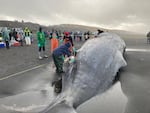A 40-foot sperm whale that beached on Oregon’s northwestern coast was killed after being struck by a ship, federal biologists conducting a post-mortem examination of the animal determined Monday.
Biologists with the National Oceanic and Atmospheric Administration’s fisheries agency, NOAA Fisheries, came to that conclusion after examining a large gash in the whale’s side.
“There was hemorrhaging, so that indicates that the animal was alive when it was struck,” said Michael Milstein, a spokesperson for NOAA Fisheries’ West Coast region.
The whale washed ashore dead on Saturday at Fort Stevens State Park in northwestern Oregon.
The biologists performed the necropsy, akin to an autopsy but for animals, at the site where the whale beached. They cut the whale open, examined its insides and took samples in order to learn about the health and condition of the whale. They determined it was a 20-year-old male, Milstein said.
Members of the NOAA’s West Coast Marine Mammals Stranding Network removed the whale’s lower jaw and teeth in order to study them, but also to protect the remains from looters.

A team performs a necropsy on the carcass of a sperm whale on the northern Oregon Coast on Monday, Jan. 16, 2023. The body washed ashore two days earlier and the necropsy will determine the whale's cause of death.
Courtesy NOAA Fisheries
“Sperm whale teeth and jaws are very prominent and quite lucrative on the black market. We removed the jaws so it did not get liberated by other means,” Milstein said.
Sperm whales, the largest toothed whale, were nearly decimated by the whaling industry in the 19th and 20th centuries. The prized waxy substance found in their heads, spermaceti, was used in oil lamps, lubricants and candles. They are listed as endangered under the Endangered Species Act.
There are hundreds of reports of stranded marine mammals on the West Coast every year, according to the NOAA network, which operates nationwide and is composed of scientific investigators and institutions, wildlife and fisheries agencies, law enforcement and volunteers.
Samples and information collected from stranded animals are often used for scientific purposes to learn more about their populations and their health.
The cause of stranding is unknown in most cases, the network says, but it can include disease, parasites, harmful algal blooms, injuries from ships or fishing gear, pollution and starvation. Most stranded animals are found dead. In a limited number of cases, animals that are alive can be transported to rehabilitation centers. Those that successfully rehabilitate can be returned to the wild in rare cases, according to the network.
Although not unheard of, it’s unusual for a whale to wash up in northern Oregon during a time of year when most have migrated south for the winter.
Sperm whales are the third most frequent species to strand on Oregon’s coast, after gray whales and humpbacks, according to Milstein.
The next challenge will be figuring out how to dispose of the carcass. Whales that wash ashore are often buried where they lay on the beach, Milstein said, while adding that he wasn’t sure what the plan is for removing the dead sperm whale in this case.

People gather near Fort Stevens State Park along the northern Oregon coast in this photo taken Saturday, March 21, 2020. Officials are urging people to not do this near the body of a sperm whale in the area that washed ashore Saturday, Jan. 14, 2022.
Todd Sonflieth / OPB
In the meantime, officials have urged curious onlookers to keep their distance from the carcass.
It’s also illegal for people to handle or harass beached marine mammals.
Claire Rush is a corps member for the Associated Press/Report for America Statehouse News Initiative. Report for America is a nonprofit national service program that places journalists in local newsrooms to report on undercovered issues. Follow Claire on Twitter.
